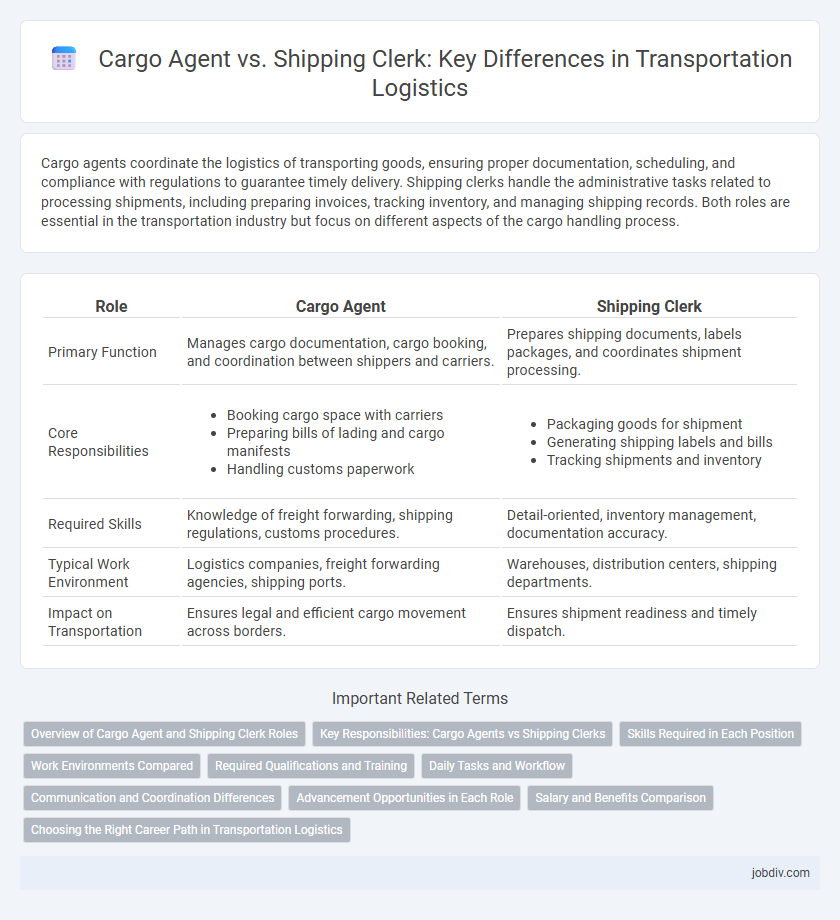Cargo agents coordinate the logistics of transporting goods, ensuring proper documentation, scheduling, and compliance with regulations to guarantee timely delivery. Shipping clerks handle the administrative tasks related to processing shipments, including preparing invoices, tracking inventory, and managing shipping records. Both roles are essential in the transportation industry but focus on different aspects of the cargo handling process.
Table of Comparison
| Role | Cargo Agent | Shipping Clerk |
|---|---|---|
| Primary Function | Manages cargo documentation, cargo booking, and coordination between shippers and carriers. | Prepares shipping documents, labels packages, and coordinates shipment processing. |
| Core Responsibilities |
|
|
| Required Skills | Knowledge of freight forwarding, shipping regulations, customs procedures. | Detail-oriented, inventory management, documentation accuracy. |
| Typical Work Environment | Logistics companies, freight forwarding agencies, shipping ports. | Warehouses, distribution centers, shipping departments. |
| Impact on Transportation | Ensures legal and efficient cargo movement across borders. | Ensures shipment readiness and timely dispatch. |
Overview of Cargo Agent and Shipping Clerk Roles
Cargo agents coordinate the transport of goods, ensuring accurate documentation and compliance with shipping regulations, while managing communication between shippers and carriers. Shipping clerks handle the preparation and processing of shipping documents, verify inventory, and organize the loading and dispatch of shipments to meet delivery schedules. Both roles are essential for efficient supply chain operations, with cargo agents focusing on logistics coordination and shipping clerks emphasizing documentation and shipment processing.
Key Responsibilities: Cargo Agents vs Shipping Clerks
Cargo agents coordinate shipments, handle freight documentation, and communicate with carriers to ensure timely delivery, focusing on customer service and logistics planning. Shipping clerks manage the physical processing of shipments, including packing, labeling, and inventory control, ensuring accuracy and compliance with shipping regulations. Both roles require attention to detail and coordination but differ in their emphasis on operational tasks versus customer and carrier interaction.
Skills Required in Each Position
Cargo agents require strong organizational skills, attention to detail, and proficiency in logistics software to coordinate shipments and track cargo efficiently. Shipping clerks need expertise in inventory management, documentation accuracy, and basic accounting to process orders and maintain shipment records. Both roles demand communication skills and knowledge of safety regulations, but cargo agents prioritize customer interaction while shipping clerks focus on internal processing and record-keeping.
Work Environments Compared
Cargo agents typically work in busy transportation hubs such as airports, seaports, and freight terminals where they coordinate logistics and manage shipments in fast-paced environments. Shipping clerks are often employed in warehouses, distribution centers, or manufacturing facilities, focusing on organizing, documenting, and verifying outgoing shipments. Both roles require strong attention to detail, but cargo agents face more public interaction and regulatory compliance, while shipping clerks concentrate on inventory accuracy and internal coordination.
Required Qualifications and Training
Cargo agents require formal training in logistics or supply chain management, often holding certifications like the Certified Cargo Specialist (CCS) to handle freight documentation and regulations. Shipping clerks typically need a high school diploma, with on-the-job training focusing on inventory control, order processing, and basic shipping procedures. Both roles demand knowledge of transportation regulations, but cargo agents require advanced expertise in international shipping and hazardous materials handling, differentiating their qualification needs.
Daily Tasks and Workflow
Cargo agents coordinate and manage freight shipments, handling booking, documentation, and communication with carriers and clients to ensure timely cargo movement. Shipping clerks focus on preparing shipping documents, labeling packages, and verifying inventory for outgoing deliveries, maintaining accurate records for transportation compliance. Both roles require attention to detail and coordination with logistics teams, but cargo agents primarily manage shipment logistics while shipping clerks emphasize documentation and package preparation.
Communication and Coordination Differences
Cargo agents primarily manage communication between shippers, carriers, and customers, ensuring accurate documentation and timely updates. Shipping clerks focus on coordinating internal warehouse activities, verifying shipment details, and preparing shipping labels and invoices. While cargo agents act as external liaisons, shipping clerks handle operational coordination within the logistics process.
Advancement Opportunities in Each Role
Cargo agents often have clearer pathways for advancement into logistics management and freight coordination roles due to their direct interaction with shipment scheduling and client relations. Shipping clerks typically progress to roles such as warehouse supervisors or inventory control specialists, leveraging their expertise in documentation and package handling. Both positions offer growth potential, but cargo agents usually experience faster career development in global supply chain operations.
Salary and Benefits Comparison
Cargo agents typically earn an average salary ranging from $35,000 to $50,000 annually, while shipping clerks earn between $30,000 and $45,000, reflecting slight differences based on experience and geographic location. Benefits for cargo agents often include comprehensive health insurance, retirement plans, and performance bonuses, whereas shipping clerks may receive standard health coverage, paid time off, and occasional overtime pay. Job complexity and responsibility levels primarily influence the salary scale and benefits offered in these transportation roles.
Choosing the Right Career Path in Transportation Logistics
Cargo agents handle customer interactions, freight documentation, and coordinate shipments, ensuring efficient cargo movement. Shipping clerks focus on organizing shipping schedules, verifying shipment details, and maintaining accurate inventory records to support logistical operations. Understanding the distinct responsibilities helps professionals align career choices with skills in customer service or operational accuracy within transportation logistics.
Cargo Agent vs Shipping Clerk Infographic

 jobdiv.com
jobdiv.com